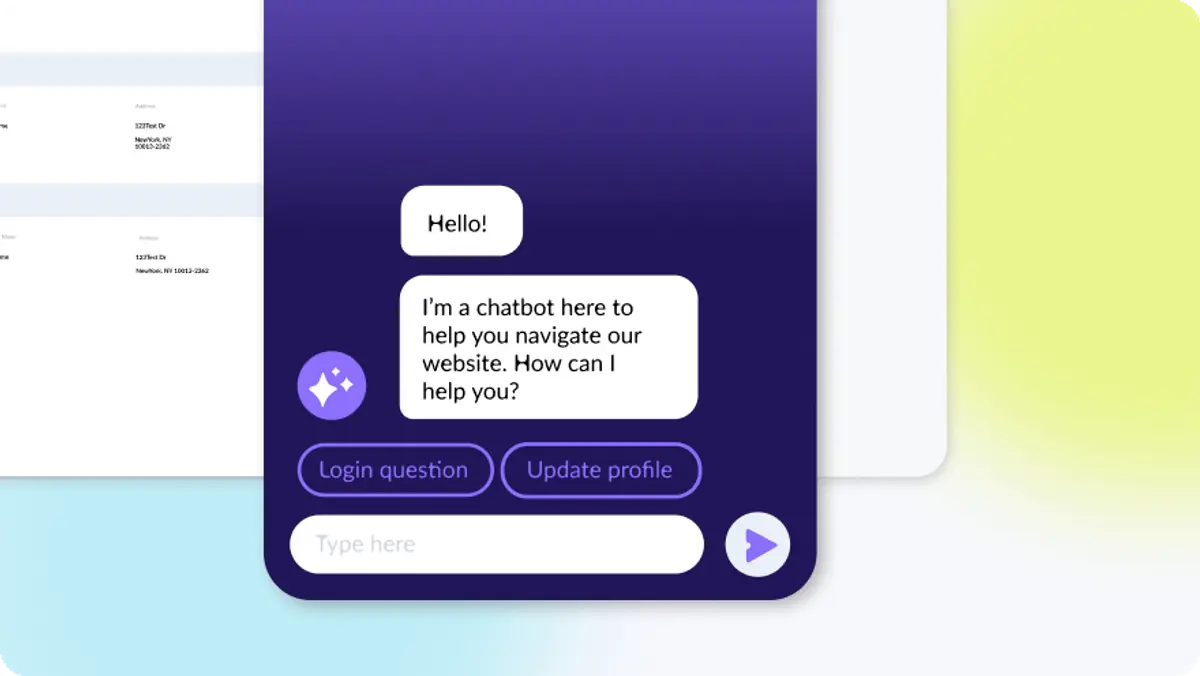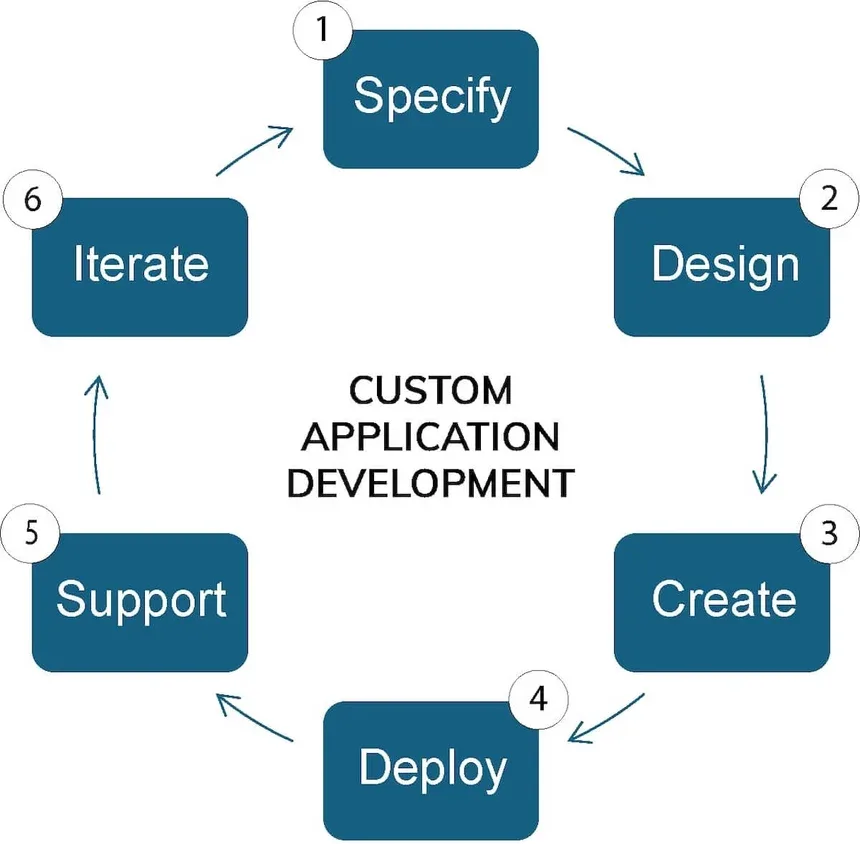Get the Software Solution You Want With Custom Application Development
Learn what custom application development looks like, why it’s worth investing in it instead of an off-the-shelf solution, and how to get started.
Aug 14, 2024

Using software applications as a strategic part of operating and growing your business is no longer a question. However, you should still ask what types of software solutions best deliver the functionality that addresses your business needs. In most cases, you will start with a list of off-the-shelf solutions. But if you really want to have greater value for your investment, you should also consider custom application development to get exactly what you need.
Custom application development is a process where stakeholders in your company work with a software development team to design, create, and maintain a custom software application. At first glance, this may seem like a significant effort. But even if the initial effort requires more work, trying to fit the square peg of off-the-shelf software into the round hole of your business needs can cost more in time, money, and lost business opportunities over time.
Companies that embrace custom application development see a better focus on business needs, a concentration of effort on aspects delivering greater value, an improved user experience, tighter security, stronger IP protection, and more seamless integration with other software assets. These benefits, and others we will explore, can positively impact employee productivity, customer satisfaction, actionable business information, and ultimately, the bottom line.
What Is Custom Application Development?
Custom application development is a process in which your business gets a tailor-made software application that meets your exact requirements and specific needs.
A software application is created with a programming language that may or may not require coding, has a user interface, stores data somewhere, and interfaces with other applications through application programming interfaces (APIs).
The form your custom application takes depends on how you want to develop your tool and where users will access it. The most common types of custom apps are:
- Web applications: Runs on web servers and uses a browser as the user interface.
- Enterprise applications: Large software solutions for specific business use cases that are used across the company.
- Mobile applications: Created for a specific type of mobile platform, usually iOS or Android.
- Cross platform application: Developed for multiple mobile platforms using an application development platform.
8 Reasons to Invest in Custom Application Development
Off-the-shelf software can seem attractive. The cost is spread out over time rather than upfront, and in the demo, it always looks like the tool can do what you need. But the reality is, every business is different, and a flashy but impractical app won’t keep your employees from going back to traditional spreadsheets to get their job done. Custom application development delivers the right solutions and adapts as your needs change.
Some of the most common reasons businesses seek out custom application development are as follows.
1. Focuses on Your Business Needs
The team creating your custom solution will start by understanding your business needs, and then design and develop the software to specifically address those unique requirements. Instead of looking for the functionality you need (and maybe not finding it), you design it from the start.
2. Concentrates Development Efforts on Areas with the Greatest Value
Instead of paying for features you don’t want or need, custom application development efforts put resources to work on the functionality that achieves your business objectives.
3. Optimizes Work Flows and User Experience
An unpleasant reality of off-the-shelf software tools is that your internal teams and external users will need to change their business processes to fit the workflows built into the tool. With custom apps, you can map out your workflows and then have the most efficient implementation created.
4. Minimizes Cost
Custom software development can be cost-effective and tailored to your budget. With today’s off-the-shelf SaaS solutions, you are paying a significant amount of money per user per month to get functionality that only slightly addresses your needs. And you are often paying for features you don’t need.
Once you pay the upfront custom development costs, you have flexible capability and efficiency without per-user and per-month costs. Plus, you get to skip the cost of paying employees to create workarounds to overcome missing capabilities in an off-the-shelf software.
5. Scales and Adapts to Changing Business Needs
The true value of custom apps really starts once the initial release is done and your company begins to grow and needs app changes. Custom apps deliver both scalability and increased productivity. Stakeholders can identify areas that will benefit from automation, point out integrations that drive greater customer understanding, and implement new capabilities to address new markets and new processes. This is where working with Focused Labs really pays off because we don’t just write the software, we work with you to build a team that can scale and adapt the tools we build together.
6. Integrates Easily With Other Digital Assets
Difficult integration with other applications is another significant disadvantage of commercial applications. A custom software application can easily integrate with your existing systems without the need for another third-party API. And because you control the data and know where and how it is stored in the backend, it takes less effort to gain access to the information you need and share it with other applications.
7. Minimizes Security Risks
When you opt for a shared software platform, someone else is responsible for the security of your business-critical information. They need to make sure there are no vulnerabilities in the software and that hackers can’t get to it. Developing custom applications brings your data back under your own control.
8. Protects Your IP and Delivers Competitive Advantages
You can’t build your secret sauce into an off-the-shelf software tool. You can create outstanding user experiences, custom calculations, unique data models, or disruptive technology into a custom application.
What Does the Custom Application Development Process Look Like?
Most companies use a process for custom applications built on established methodologies. What makes custom application development unique is the strong focus on input from end-users and a focus on delivering value to the company.
Although the needs of each company and project vary, here are the six steps most efforts follow:

1. Specify
Work closely with your development partner to define the scope and specific requirements for your app from stakeholders. Assign a priority to each and make sure you are ruthless about focusing on features that are needed.
2. Design
Take the specifications and lay out the functionality, workflow, features, and usability of the custom application. Make sure that you build a positive user experience, maintainability, and needed functionality into the design from the start. Being able to make these informed choices is where many of the benefits of custom application development are derived, so don’t rush through this part. Choose a development partner like Focused Labs who are experts in the design phase of developing custom apps.
3. Create
Build the software. For this step, you can use an expert partner like Focused Labs to carry out this step or partner with your in-house dev team. This step can use traditional programming languages or utilize low-code or no-code platforms. Once you have working software, start quality assurance, testing, and iterating on functionality.
4. Deploy
Once you have a minimum viable product, it is time to push your product to users. Beyond making access available through downloads or logins, deployment also includes monitoring usage and providing updates and patches. Your development partner should work with your IT team to put the proper processes in place.
5. Support
When users start accessing your custom app, you need the resources in place to provide support, gather input, and get feedback to the development team on how to improve the app. This is an area that sets Focused Labs apart from most service providers. We help our clients create a strong support culture to ensure success beyond initial release.
6. Iterate
To fully benefit from a custom application, the development team will need to continuously gather input and repeat the previous steps to increase the capability and value of your application.
Tips for a Successful Custom Application Development Process
At Focused Labs, we help companies across industries achieve success with their custom application projects. It doesn’t matter if you are creating a user-friendly customer support custom web app for your clients or an enterprise resource planning (ERP) solution for a large enterprise, success depends on understanding the process, working with the right people, and continuously improving things.
Here is a list of suggestions from our experienced team to help you launch a successful custom application:
- Loop in stakeholders, keep them in the process and use them to help set priorities.
- Emphasize the use of agile project management to keep focus and drive the entire team towards common goals.
- Gather and document clear and concise requirements with assigned priorities and a list of key contacts for additional input and testing.
- Use the right tools software, libraries, DevOps tools, agile project management solutions, and automated testing procedures.
- Partner with experts that bring value to the process — companies that don’t just write code, but ones that help you understand your use cases, define your specifications, and write outstanding routines, all while helping the in-house development team improve and grow.
- Continuous iterations to gather information and make improvements — adding new features, increasing compatibility with other tools, and working to streamline user workflows.
- Automate testing and deployment to speed up the development process and get the latest version out to users.
On top of these suggestions, we have found that a more general predictor of success is companies creating a culture focused on using agile and DevOps methods to carry out the process. Solutions don’t stop at software, and that is why our custom application development services team continues to meet and exceed our customer’s expectations with our three-step process of:
- Build: We develop great apps with great people. Regardless of your stack or your specific needs, we’ll work alongside your team to build a transformative solution.
- Deploy: Using continuous integration, we use the data derived from software in production to deliver working software at scale, with measurable results.
- Learn: We help you get comfortable with agile and DevOps methodologies by launching the software we build in collaboration with your team. This trust will help you deliver best-in-class technology long after the initial project is complete.
Partner With an Expert for Custom Application Development
Once you have identified the need for a new application and determined that a custom application is the best way forward, you can get started on your project.
If this seems a little overwhelming, or you just have some questions, Focused Labs is here to help. We are the unintimidating and unintimidated technology consultants who will design, build, and deliver the right software tool, and work to grow a versatile technology culture that keeps things going after our part is finished. Reach out today and let’s work together.
